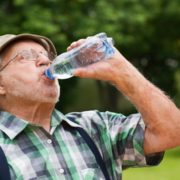Protect Yourself from the Summer Heat
Summer is a great time to spend time with family and friends. The summer sun allows us to enjoy many outdoor activities. Barbecues, swimming, and trips to the beach make summer an exceptional time of year!
For aging adults, the summer months can also be hazardous to your health and heart. Problems like dehydration, sunburn, and exasperation of pre-existing conditions are common after too much exposure to the sun. For people with heart conditions, the heat can be a matter of life and death. It’s important to stay safe when the temperature rises!
Tips for Beating the Heat:
- Stay Hydrated: Seniors are less likely to feel thirsty and dehydration can set in quickly. Be sure to drink the recommended 6 to 8 glasses of water a day.
- Apply Sunscreen: Sunscreen takes time to work, so apply it prior to going outdoors. Reapply the sunscreen every two hours.
- Dress for the Weather: Wear lightweight, breathable fabric such as cotton. Wide-brimmed hats can help protect from the sun.
- Wear Protective Eyewear: Sunglasses can help reduce damage that could cause cataracts and age-related eye disease.
- Stay Indoors During Peak Heat: The sun is most intense during the middle of the day (12pm to 3pm). Schedule your outdoor activities in the morning or evening when the weather is cooler.
- Check Your Medications: Some medications can cause increased sensitivity to the sun. Look at the warning labels and talk to your doctor about concerns or questions you may have.
How Therapy Can Help
Heat is stressful on the cardiovascular system and can exasperate cardiopulmonary conditions making it more difficult to breathe. If you have heart and lung disease, you may benefit from Physical and Occupational therapy. Therapy can help individuals manage and minimize the debilitating effects of pulmonary and cardiac diseases by helping you control your symptoms and resume an active life within the limits of your condition. Talk to your doctor today about the benefits of therapy for your cardiopulmonary needs!




